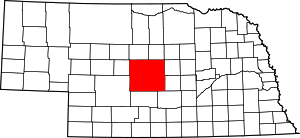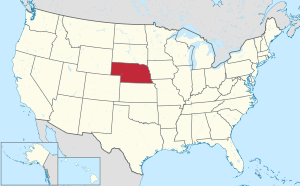Custer County, Nebraska
Custer County is a county in the U.S. state of Nebraska. As of the 2010 United States Census, the population was 10,939.[1] Its county seat is Broken Bow.[2] The county was formed in 1877[3] and named after General George Armstrong Custer,[4] who was killed at the Battle of Little Bighorn.
Custer County | |
|---|---|
Custer County Courthouse in Broken Bow | |
 Location within the U.S. state of Nebraska | |
 Nebraska's location within the U.S. | |
| Coordinates: 41°23′N 99°44′W | |
| Country | |
| State | |
| Founded | 17 February 1877 |
| Named for | George Armstrong Custer |
| Seat | Broken Bow |
| Largest city | Broken Bow |
| Area | |
| • Total | 2,576 sq mi (6,670 km2) |
| • Land | 2,576 sq mi (6,670 km2) |
| • Water | 0.4 sq mi (1 km2) 0.01%% |
| Population | |
| • Estimate (2018) | 10,840 |
| • Density | 4.2/sq mi (1.6/km2) |
| Time zone | UTC−6 (Central) |
| • Summer (DST) | UTC−5 (CDT) |
| Congressional district | 3rd |
| Website | www |

In the Nebraska license plate system, Custer County is represented by the prefix 4 (it had the fourth-largest number of vehicles registered in the county when the license plate system was established in 1922).
Geography
According to the US Census Bureau, the county has a total area of 2,576 square miles (6,670 km2), of which 2,576 square miles (6,670 km2) is land and 0.4 square miles (1.0 km2) (0.01%) is water.[5] In area, it is the second largest county in Nebraska, behind only Cherry County.
Major highways
Adjacent counties
- Valley County – northeast
- Sherman County – southeast
- Buffalo County – southeast
- Dawson County – south
- Lincoln County – southwest
- Logan County – west
- Blaine County – northwest
- Loup County – northeast
Demographics
| Historical population | |||
|---|---|---|---|
| Census | Pop. | %± | |
| 1880 | 2,211 | — | |
| 1890 | 21,677 | 880.4% | |
| 1900 | 19,758 | −8.9% | |
| 1910 | 25,668 | 29.9% | |
| 1920 | 26,407 | 2.9% | |
| 1930 | 26,189 | −0.8% | |
| 1940 | 22,591 | −13.7% | |
| 1950 | 19,170 | −15.1% | |
| 1960 | 16,517 | −13.8% | |
| 1970 | 14,092 | −14.7% | |
| 1980 | 13,877 | −1.5% | |
| 1990 | 12,270 | −11.6% | |
| 2000 | 11,793 | −3.9% | |
| 2010 | 10,939 | −7.2% | |
| Est. 2018 | 10,840 | [6] | −0.9% |
| US Decennial Census[7] 1790-1960[8] 1900-1990[9] 1990-2000[10] 2010-2013[1] | |||
As of the 2000 United States Census,[11] there were 11,793 people, 4,826 households, and 3,320 families in the county. The population density was 5 people per square mile (2/km²). There were 5,585 housing units at an average density of 2 per square mile (1/km²). The racial makeup of the county was 98.63% White, 0.07% Black or African American, 0.41% Native American, 0.15% Asian, 0.20% from other races, and 0.55% from two or more races. 0.92% of the population were Hispanic or Latino of any race. 37.3% were of German, 11.9% English, 10.6% Irish and 8.9% American ancestry.
There were 4,826 households out of which 30.30% had children under the age of 18 living with them, 60.90% were married couples living together, 5.40% had a female householder with no husband present, and 31.20% were non-families. 28.90% of all households were made up of individuals and 15.00% had someone living alone who was 65 years of age or older. The average household size was 2.39 and the average family size was 2.95.
The county population contained 26.30% under the age of 18, 5.50% from 18 to 24, 23.50% from 25 to 44, 23.70% from 45 to 64, and 21.10% who were 65 years of age or older. The median age was 41 years. For every 100 females there were 96.10 males. For every 100 females age 18 and over, there were 91.70 males.
The median income for a household in the county was $30,677, and the median income for a family was $37,063. Males had a median income of $24,609 versus $19,732 for females. The per capita income for the county was $16,171. About 9.10% of families and 12.40% of the population were below the poverty line, including 16.20% of those under age 18 and 9.10% of those age 65 or over.
Communities
Cities
- Broken Bow (county seat)
- Sargent
Census-designated place
Unincorporated communities
Politics
Custer County voters are reliably Republican. In no national election since 1936 has the county selected the Democratic Party candidate.
| Year | Republican | Democratic | Third Parties |
|---|---|---|---|
| 2016 | 83.1% 4,695 | 11.3% 641 | 5.6% 316 |
| 2012 | 78.1% 4,296 | 19.7% 1,083 | 2.2% 119 |
| 2008 | 77.1% 4,301 | 21.4% 1,192 | 1.5% 85 |
| 2004 | 80.5% 4,518 | 18.5% 1,040 | 1.0% 54 |
| 2000 | 78.4% 4,245 | 18.0% 976 | 3.6% 193 |
| 1996 | 64.2% 3,453 | 24.0% 1,293 | 11.8% 637 |
| 1992 | 54.6% 3,180 | 19.4% 1,126 | 26.0% 1,514 |
| 1988 | 73.4% 4,203 | 26.1% 1,496 | 0.5% 27 |
| 1984 | 80.9% 4,749 | 18.6% 1,090 | 0.5% 28 |
| 1980 | 76.9% 4,563 | 17.0% 1,011 | 6.1% 360 |
| 1976 | 63.7% 3,935 | 32.2% 1,985 | 4.1% 255 |
| 1972 | 80.8% 4,836 | 19.2% 1,147 | |
| 1968 | 70.5% 4,325 | 22.9% 1,407 | 6.5% 401 |
| 1964 | 53.0% 3,916 | 47.0% 3,475 | |
| 1960 | 70.9% 5,716 | 29.1% 2,350 | |
| 1956 | 70.5% 5,798 | 29.5% 2,425 | |
| 1952 | 77.2% 7,143 | 22.8% 2,113 | |
| 1948 | 54.7% 4,057 | 45.3% 3,356 | |
| 1944 | 61.6% 5,330 | 38.4% 3,321 | |
| 1940 | 59.7% 6,269 | 40.3% 4,238 | |
| 1936 | 45.7% 5,250 | 51.4% 5,907 | 2.9% 338 |
| 1932 | 35.7% 3,953 | 61.7% 6,844 | 2.6% 289 |
| 1928 | 76.4% 8,379 | 22.9% 2,506 | 0.8% 82 |
| 1924 | 40.0% 3,833 | 26.8% 2,575 | 33.2% 3,187 |
| 1920 | 59.3% 4,974 | 32.7% 2,739 | 8.0% 674 |
| 1916 | 34.2% 2,047 | 60.4% 3,609 | 5.4% 322 |
| 1912 | 18.2% 1,051 | 41.5% 2,395 | 40.3% 2,330 |
| 1908 | 47.0% 2,788 | 48.9% 2,898 | 4.1% 245 |
| 1904 | 59.6% 2,658 | 11.4% 509 | 29.0% 1,292 |
| 1900 | 47.2% 2,145 | 47.5% 2,159 | 5.2% 237 |
References
- "State & County QuickFacts". US Census Bureau. Archived from the original on July 9, 2011. Retrieved September 18, 2013.
- "Find a County". National Association of Counties. Archived from the original on 31 May 2011. Retrieved 7 June 2011.
- Burr, George L. (1921). History of Hamilton and Clay Counties, Nebraska, Vol. 1. S.J. Clarke Pub. Co. p. 105.
- Retrieved on March 14, 2008.
- "2010 Census Gazetteer Files". US Census Bureau. August 22, 2012. Archived from the original on November 13, 2013. Retrieved December 6, 2014.
- "Population and Housing Unit Estimates". Retrieved December 26, 2019.
- "US Decennial Census". US Census Bureau. Retrieved December 6, 2014.
- "Historical Census Browser". University of Virginia Library. Retrieved December 6, 2014.
- "Population of Counties by Decennial Census: 1900 to 1990". US Census Bureau. Retrieved December 6, 2014.
- "Census 2000 PHC-T-4. Ranking Tables for Counties: 1990 and 2000" (PDF). US Census Bureau. Retrieved December 6, 2014.
- "U.S. Census website". US Census Bureau. Retrieved 31 May 2008.
- Election Results
